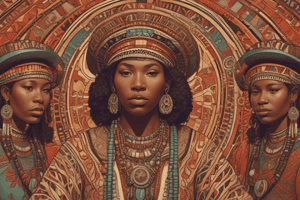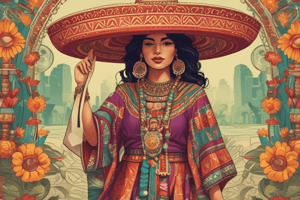Podcast
Questions and Answers
According to the content, what is the primary distinction between 'lo político' (the political) and 'la política' (politics)?
According to the content, what is the primary distinction between 'lo político' (the political) and 'la política' (politics)?
- Lo político is the ethical dimension of governance, while la política is the amoral pursuit of power.
- Lo político is the theoretical study of power, while la política is its practical application.
- Lo político refers to the _private_ sphere, while la política concerns the _public_ sphere.
- Lo político represents the _public_ sphere, while la política involves the management of the _public_ sphere. (correct)
Which of the following best describes the concept of 'sovereignty' as presented in the content?
Which of the following best describes the concept of 'sovereignty' as presented in the content?
- Sovereignty is the supreme power or authority of a state to govern itself without external interference. (correct)
- Sovereignty is the delegation of power from the people to an elected government.
- Sovereignty is the absolute and unlimited authority of a ruler, unconstrained by laws or customs.
- Sovereignty is the recognition of a state's authority by international organizations.
The content contrasts Hobbes' and Rousseau's views on sovereignty. How do they differ?
The content contrasts Hobbes' and Rousseau's views on sovereignty. How do they differ?
- Hobbes sees sovereignty as residing in the individual, whereas Rousseau emphasizes the state's sovereignty.
- Hobbes focuses on external sovereignty (independence from other states), while Rousseau is concerned with internal sovereignty (legitimacy within the state).
- Hobbes advocates for popular sovereignty, while Rousseau supports a monarchical sovereign.
- Hobbes believes the sovereign is an absolute authority (the Leviathan), while Rousseau argues for the people's general will as sovereign. (correct)
What is the 'Doctrina Estrada' (Estrada Doctrine), and how does it relate to a country's foreign policy?
What is the 'Doctrina Estrada' (Estrada Doctrine), and how does it relate to a country's foreign policy?
In the context of the Mexican Constitution, what is the distinction between the 'Dogmática' and 'Orgánica' parts?
In the context of the Mexican Constitution, what is the distinction between the 'Dogmática' and 'Orgánica' parts?
According to Article 3 of the Mexican Constitution, what is the state's responsibility regarding education?
According to Article 3 of the Mexican Constitution, what is the state's responsibility regarding education?
Which of the following best describes the relationship between 'relato,' 'narrativa,' and 'discurso' according to the provided content?
Which of the following best describes the relationship between 'relato,' 'narrativa,' and 'discurso' according to the provided content?
How does 'aculturación' differ from 'transculturación,' based on the provided context?
How does 'aculturación' differ from 'transculturación,' based on the provided context?
According to Article 31, what are citizens obligated to do?
According to Article 31, what are citizens obligated to do?
What does Article 4 of the Mexican Constitution guarantee?
What does Article 4 of the Mexican Constitution guarantee?
What is the relationship that describes the link between 'cultura' and 'identidad' according to the text?
What is the relationship that describes the link between 'cultura' and 'identidad' according to the text?
Considering the information about the fall of the Mayan civilization, what were the primary contributing factors to their decline?
Considering the information about the fall of the Mayan civilization, what were the primary contributing factors to their decline?
How did the Spanish utilize education as a tool of conquest, as described in the text?
How did the Spanish utilize education as a tool of conquest, as described in the text?
Based on the content, what key factor enabled Hernán Cortés to overthrow the Aztec empire?
Based on the content, what key factor enabled Hernán Cortés to overthrow the Aztec empire?
What distinguishes 'arte' from 'artesanía' according to the provided text?
What distinguishes 'arte' from 'artesanía' according to the provided text?
How is 'ideología' formed according to the provided content?
How is 'ideología' formed according to the provided content?
Flashcards
What is 'the political'?
What is 'the political'?
Public affairs and concerns.
What is politics?
What is politics?
The management and administration of public affairs.
What is sovereignty?
What is sovereignty?
The independence of an actor (like a country) to act freely.
Hobbes' view of the sovereign
Hobbes' view of the sovereign
Signup and view all the flashcards
Rousseau's view of the sovereign
Rousseau's view of the sovereign
Signup and view all the flashcards
What is the Estrada Doctrine?
What is the Estrada Doctrine?
Signup and view all the flashcards
What is the Dogmatic part of a Constitution?
What is the Dogmatic part of a Constitution?
Signup and view all the flashcards
What is the Organic part of a Constitution?
What is the Organic part of a Constitution?
Signup and view all the flashcards
What is 'Mexicano'?
What is 'Mexicano'?
Signup and view all the flashcards
Relato (Narrative)
Relato (Narrative)
Signup and view all the flashcards
Narrativa
Narrativa
Signup and view all the flashcards
Arte (Art)
Arte (Art)
Signup and view all the flashcards
Artesanía (Crafts)
Artesanía (Crafts)
Signup and view all the flashcards
Folklore
Folklore
Signup and view all the flashcards
Cultura (Culture)
Cultura (Culture)
Signup and view all the flashcards
Identidad (Identity)
Identidad (Identity)
Signup and view all the flashcards
Study Notes
- Understanding Mexico's diversity is necessary before proposing changes because understanding the problem is necessary.
- Mexican diversity includes how people are, and all the other aspects of what they are becoming
- What is considered "Mexican" relates to everything associated with “Mexico"
Components of the Imaginary
- Relato: A history of how something concrete happened.
- Narrativa: A collection of stories pointing to the same conclusions.
- Discurso: Composition of repeated narratives by a social actor with a specific purpose.
- Arte: Is a human expression that transmits an idea, emotion, or vision of the world
- Artesanía: Crafts produce multiple works for practical use, while art creates unique pieces
Culture concepts
- Folklore: The body of expression of a specific culture.
- Cultura: A set of beliefs and knowledge of a society, including stories, narratives, and imaginaries.
- Endoculturación: When the older generation transmits culture to the younger generation.
- Aculturación: When a more powerful culture (militarily) is imposed on another culture.
- Transculturación: The process by which a culture forcibly or influenced adapts from another culture.
- Identidad: The sense of belonging of a person to a Nation-State, perceiving a nation as a whole represented in a culture, it is a collective process.
- Ideología: A set of values that prescribes specific social and political behavior, where stories, narratives, imaginaries, culture, and identity are sources of ideology
History of Mexico
- History could begin with irrigation
Indigenous Peoples:
- Olmecs: Known for the towns where they made big heads of gods
- Zapotecas: The first metropolis of Mesoamerica, suffered from population growth and insufficient food, Teotihuacan was a main commercial partner.
- Teotihuacán: Commerce was protected by military force, its fall was due to the Chichimeca invasion and being burned for raising taxes, without economic competition.
- Mayas: Known for the calendar and astronomy, invented the number 0, and they disappeared due to deforestation which drove away the rain, a rise in tributes and taxes, which brought famine.
- Méxicas (Aztecas): Moctezuma's headdress.
- Hernan Cortes united with the Mixtecs to overthrow the Aztec people due to a lack of alliances with the Aztecs.
- Spanish Conquest (Ideología): The Dominicans taught them to read so they could read their history, also, there was an excess of abuses by spaniards to the natives
- Chichimecas aka Huachichiles: Nomads, Hunters, launched the Chichimeca war against Teotihuacan culture.
Political Concepts:
- Que es lo politico?: Means what is public
- Que es la política?: Means the management of what is public.
- Que es la Soberanía?: Is when an actor is independent to act.
- Mexico is not a sovereign country because it wants to avoid bothering other countries
Sovereignty concepts
- Hobbes: The sovereign is the leviathan that is above all, and its will is the law.
- Rousseau: In this context, the sovereign is the people who decree the general will in the law.
- Sovereignty is independence, a limited, absolute, and arbitrary character.
- Doctrina Estrada: It refers to the principle of non-intervention.
Constitution basics
- Dogmatica: It is the study of people's rights
- Orgánico: Studies how a dogma is organized.
- Everyone in Mexico is equal, but that is only written on paper.
- Education - Art 3: The state is responsible for the right of children to education
Obligations and rights
- The Constitution sustains the legal framework outlining the obligations of Mexicans
- (Art 31) Parents/guardians are responsible for ensuring their children attend school to receive education, which is obligatory.
- Citizens must attend civic and military instruction provided by the local government.
Legal Obligations
- Citizens are obligated to enlist and serve in reserve corps according to the law to ensure and defend independence, and contribute to public expenses at the federal, state, and municipal levels.
Political Rights
- (Art 35) Citizens have the right to freely and individually participate peacefully in the country's political affairs.
Legal Guarantees
- (Art 4) Men and women are equal before the law and the protection of family organization and development, every person has the right to decide freely and responsibly on the number and spacing of their children.
- The Río Nueces used to form the border between the United States and Mexico before the Río Bravo.
Studying That Suits You
Use AI to generate personalized quizzes and flashcards to suit your learning preferences.




